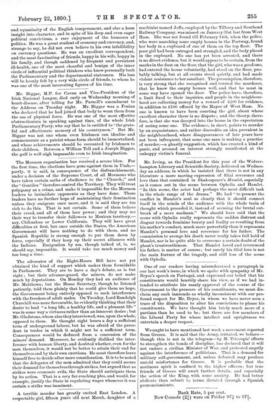The advocates of the Eight-Hours Bill have not yet obtained
the kind of support which makes them formidable in Parliament. They are to have a day's debate, as is but right ; but their advance-guard, the miners, do not make much by deputations. On Monday they had an audience of Mr. Matthews ; but the Home Secretary, though he listened patiently, told them plainly that he could give them no hope, the Government being entirely opposed to such interference with the freedom of adult males. On Tuesday, Lord Randolph Churchill was more favourable, he evidently thinking that their desire to lead " a long life, a healthy life, and a pleasant life " was in some way a virtuous rather than an innocent desire ; but Mr. Gladstone, whom also they interviewed, was, upon the whole, opposed to them. He thought eight hours a day a sufficient term of underground labour, but he was afraid of the prece- dent in trades in which it might not be a sufficient term. Consequences would be deduced from a concession of the miners' demand. Moreover, he evidently disliked the inter- ference with human liberty, and doubted whether, even for the men themselves, it would not be better to attain their end for themselves and by their own exertions. He must therefore leave himself free to decide after more consideration. It is to be noted that the delegates of the men admitted that they could secure their demand for themselves through strikes, but argued that as strikes were economic evils, the State should anticipate them by its action. That is a very far-reaching plea, and would, for example, justify the State in regulating wages whenever it was certain a strike was imminent.






































 Previous page
Previous page